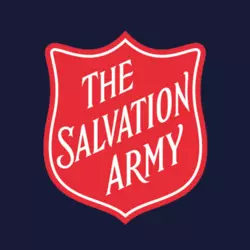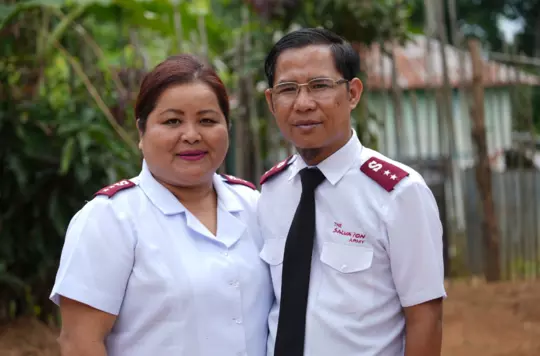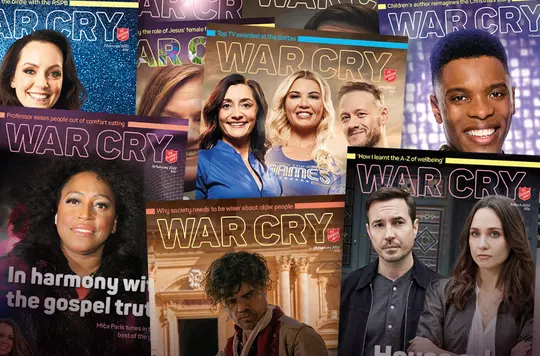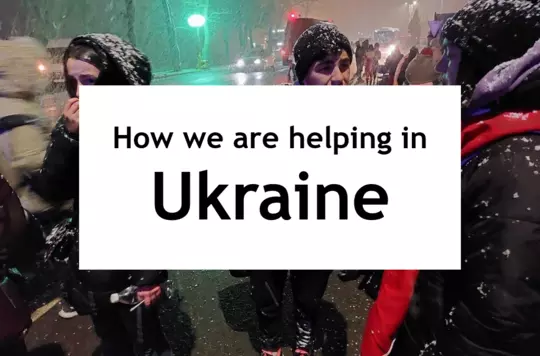24 February 2024
Safe and sound: Supporting Ukrainian refugees in Glasgow
Philip Halcrow

As Ukraine marks two years since Russia's invasion, War Cry's Philip Halcrow speaks to music student Mariia Bahach, who has been welcomed to a Salvation Army centre for Ukrainian refugees.
Two years ago, on 24 February, Russia attacked Ukraine, triggering a war that led millions of people to flee the country – among them violin student Mariia Bahach.
Mariia was so lost in music that she was not ready for what was about to happen. ‘It was a big shock for me,’ she says. ‘The day before, I didn’t notice the news, because I was just going to college and practising a lot.
'As usual I finished my practice late at night, then I took the bus home. And then, when it happened, I just didn’t believe that it had started. I still wanted to go to my teacher. I wanted to do some lessons. I was so shocked.’
Mariia is no longer in Ukraine. After Russia invaded on 24 February two years ago, she uprooted herself from her country and made a series of journeys, which took her to Glasgow and enabled her to keep making music – thanks to the Royal Conservatoire of Scotland, where she is studying, and to The Salvation Army, which is providing her and tens of other refugees with a place to live.

‘Music is a very important part of my life,’ says Mariia – an assessment that seems to be reflected even in her description of her home city.
‘I’m from Kharkiv,’ she says, ‘which is a big city with lots of halls for concerts and a beautiful conservatoire.’
In Kharkiv, Mariia was at music college. ‘I got a junior bachelor there,’ she says. Then war interrupted.
‘At first my family thought we would stay,’ she says. ‘But, because Kharkiv is near Russia, there was a lot of fire. It had become so dangerous. So we went with others to the train station. It was full of people. We took a train out of there and then went through Romania to Turkey.
‘My aunt lives in Turkey, so I stayed with her for about six months, and I tried to decide what I could do. It was confusing. I could not continue my studies at the music college. I thought I needed a community where I could continue being a musician. So I tried to find a good place to study. I applied to Germany, to New Zealand and to Scotland – which accepted me.
‘Now I am with my sister in Scotland, and the rest of my family are in Lithuania. I’m very grateful that they’re safe.’
After arriving in Scotland, at first Mariia was given accommodation on one of two cruise ships set up to house refugees. Some from the ship went on to live with host families. Mariia was among those who took accommodation at a centre for refugees being run by The Salvation Army.
The old university building in Barrack Street, Glasgow, had been taken on by The Salvation Army at the request of South Lanarkshire Council, which was working to resettle refugees.
Karen Good, contract manager at Barrack Street, explains: ‘We provide 150 rooms for Ukrainian refugees fleeing the war. The majority are working or studying and some even still have employment in Ukraine but are working from here.
'As well as providing accommodation, we identify what their aspirations are and try to find out whether they want to go to university, whether they want to stay or move on, and whether we can assist with completing applications for housing.’
Karen says that her team do more than just manage the site and help with practicalities.
She says: ‘We’re a Christian organisation, and The Salvation Army’s ethos is to go above and beyond. So the centre is like a community. The Ukrainians value community, and one thing we do here is get people together.
‘We also deal with trauma. Just because somebody feels settled and safe, it doesn’t mean that they’ve not still got a lot of trauma. So the team work really hard with that, having one-to-ones with people and making sure that support is in place for them. We have a chaplaincy team that works closely with us.
‘Generally we try to do things that can perk people up a wee bit. We’ve got a lot of things happening here. We have music lessons and language lessons – we’ll do some English, but then we’ll also have somebody who’s teaching us Ukrainian and Russian.
‘Similarly we have activities where people can get a taste of home – they’ll bake food for us and we’ll do the same for them. We mark dates in the calendar so that the Ukrainians can understand more about life here and we can learn more about their culture.

'Just because they’re here, it doesn’t mean they need to forget about their culture. The aim is that they’re going to return home when it is safe to do so.’
Always wanting to nurture and encourage expressions of culture, when the team learnt that Mariia was a musician they asked if they could hear her play.
‘Mariia had come down from her room and we got talking. She explained that she played the violin and was studying at the Royal Conservatoire. We wondered if she would mind playing for us. She played for us and in front of other residents. And she loved it.’
Mariia invited her fellow music student, pianist Anna-Mariia Hryoriak, to accompany her at a staff meeting in Glasgow and a lunchtime concert at a Salvation Army headquarters in London.
Anna-Mariia was also at music college in Ukraine when war broke out. Her home city of Chernivtsi is close to Romania and so – as she describes it – ‘is a more safe place in Ukraine’. In fact, some members of her family who were living in Kyiv or other regions of the country travelled to her home for safety.
Nevertheless, she says that when war broke out and the sirens sounded around the city, ‘it was really scary’. The invasion changed her plans.
‘Before the war, I wanted to study in Kyiv or Odessa,’ she says, ‘but when the war started, my parents said they would be nervous about me if I studied there, because all the time it is bombed. So we decided that I should study in another country.’
Having travelled to Scotland, Anna- Mariia lives with a host family and studies at the Royal Conservatoire, where she linked up with Mariia. Both were keen to play when invited by The Salvation Army.
‘Mariia is so musically orientated,’ says Karen. ‘We have tried to support her in that.
‘For instance, our building is very large, but there were not a lot of places where she could go to practise her violin. She was having to stay late at night at the university to practise there. We have another building across the road, so we said she could go there, where she doesn’t have to play quietly.’
Mariia says that music has helped her over the past couple of years.
‘I just need music,’ she says. ‘It’s necessary to be in this community to have the opportunity to continue my education, my skills. I love music because it opens your soul – and you can use it to support other people and support yourself. I hope in the future that I will be a composer as well as a violinist.’
But, looking ahead, Mariia has an even greater desire. ‘The first hope for us all is the security of our families and for peace in Ukraine,’ she says.
Interview by

Philip Halcrow
Deputy Editor, War Cry
Discover more

As the Israel-Gaza conflict continues, Captain Ben Cotterill highlights the need for non-polarised thinking in our interactions.

Captains Anthony and Makimi share their experience working at the Army’s Adult Rehabilitation Centre in India for the 2024 Self-Denial Appeal.

